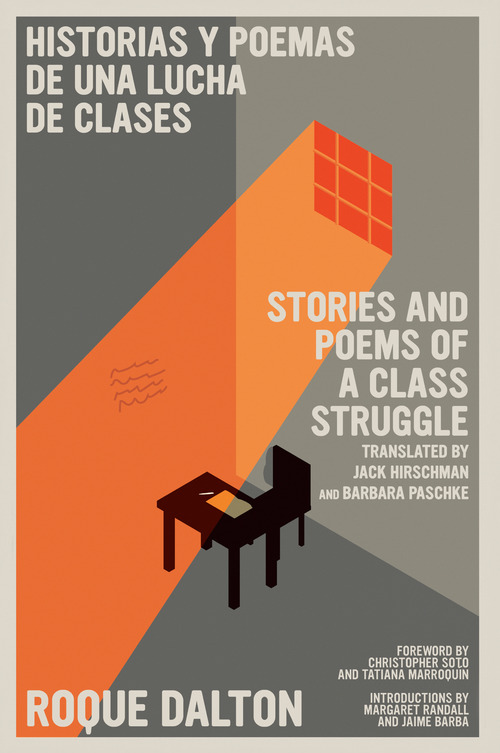Stories and Poems of a Class Struggle
Historias y poemas de una lucha de clases
Roque Dalton
Translated by Jack Hirschman and Barbara Paschke
Seven Stories Press ($18.95)
One Impossible Step: Selected Poems
Orides Fontela
Translated by Chris Daniels
Nightboat Books ($17.95)
At first glance, not much connects the work of poets Roque Dalton (1935–1975) from El Salvador and Orides Fontela (1940–1998) from Brazil. Dalton, a committed revolutionary in the armed struggle leading up to his country’s civil war, writes poems in the direct, colloquial expression of everyday people—they are not didactic, yet they do wear their political and social concerns on their sleeves. Fontela’s poems, on the other hand, are far more hermetic; elusive, abstract, and philosophical. And of course, Fontela writes in Portuguese, Dalton in Spanish. Yet the two are contemporaries whose work responds to social conditions during turbulent times.
Looking at these two disparate poets together—that is, reading them through each other’s lenses—enhances the parameters with which the work of each might be framed. Dalton becomes more philosophical, while Fontela gains in political gravity. Take a short poem by each. Here is one of Fontela’s “Seven Bird Poems”:
We’ll never know
such purity:
bird devouring us
while we sing it.
And this is Dalton’s “Poetic Art 1974”:
Poetry
Forgive me for having helped you understand
you’re not made of words alone.
In each case, the poet addresses their art, Dalton directly and Fontela through the archetypal image of a bird. While Fontela uses the universal “we”—as translator Chris Daniels notes, “Fontela almost never wrote the word ‘eu,’ the subjective form of the Portuguese first-person singular pronoun”—Dalton maintains an intimate “I-Thou” relationship, asking forgiveness for expanding poetry’s knowledge of itself. In both cases, the power of poetry to reach beyond language’s supposed meaning is stressed, albeit from opposing perspectives. Dalton implies the revolutionary context of his poem by including the year in the title, suggesting that poetry has a role to play in a time of cultural unrest and armed struggle, but Fontela also rejects the supposed rarification of poetry—“such purity”—in favor of the more active, even violent, “devouring us” that is within the art form’s transformative power. And while different in tone, both poems extol how poetry can elevate our ability to conceive the world anew. 
Drawing from all of Fontela’s collections of poetry, One Impossible Step represents not only the broadest translation of her corpus into English, but, at only 130 pages, it also operates as a compact overview of her biography and poetics. Daniels (who has also translated Pessoa among other Lusophone authors) ingeniously includes some twenty pages of excerpts from three interviews with Fontela, and Brazilian poet Ricardo Domeneck contributes a succinct afterword that assesses the trajectory of her life and work. Domeneck describes Fontela as
A person who owned no property, who felt neither the need nor the desire for a love relationship, perhaps [she] was uninterested in praising anything but oxygen. Perhaps her poverty led her to abandon adornment and poetic beautification. . . . demonstrat[ing] the linguistic attention of a post-war poet living a historical moment that demanded, in the use of symbols, an awareness of their being signs.
Dalton is much better known to U.S. readers; an earlier edition of this very book, published in the early 1980s under the title Poemas Clandestinos/Clandestine Poems, went through multiple printings. Now released as Stories and Poems of a Class Struggle as the first of a several Dalton translations to be issued over the coming years, it is actually the last, likely unfinished, work of Dalton’s; it comprises five sets of poems by distinct “authors” invented by the poet (though these pseudo-pseudonymous characters are nothing on the scale of Fernando Pessoa’s heteronyms). It’s unclear quite what Dalton had in mind by casting his voice into different personas, yet perhaps it is more important to draw attention to what these figures have in common: a belief in the necessity of cultural revolution and the use of poetry as a means towards that end. An opening “Declaration of Principles” signed by “the authors” closes by stating that the “enemy poet” (as opposed to the “servant poet” or “clown poet”) must have “a lucid and invincible confidence in the working class” and engage in “direct participation in its struggle.”
Fontela came from the working class, went to school to study philosophy on a scholarship, scraped by as a teacher, then “died in a public hospital in 1998, without a close family, destitute as a poet.” Dalton’s father was an American who financially provided for his education; he traveled internationally, spent time in Cuba honing his belief in communism and guerilla skills, and was tragically murdered in 1975 at the hands of his fellow revolutionaries in El Salvador , a victim of political infighting. Despite the vast differences in their lives, however, both poets created a body of literature hinged upon life—and because of this, these new translations of their work into English are vital.
Click below to purchase these books through Bookshop and support your local independent bookstore:
Rain Taxi Online Edition Summer 2024 | © Rain Taxi, Inc. 2024

